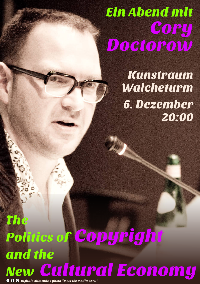Cat purr
Phantom purring =^.^=
 Das Musikbusiness
Das Musikbusiness
Funktionsweise, Eigenarten und Untergang
Eine Zusammenstellung von Fakten, Hintergründen und Möglichkeiten zum Thema Musikproduktion und -publikation
von Andy Stamm / Murphy’s Law veröffentlicht am 26. Juli 2013
Please find a copy of Lawrence Lessig’s lecture on “Aaron’s Laws – Law and Justice in a Digital Age“, which he held a few days ago at Harvard Law school.
slides:
“We are not self-made. We are dependent on one another. Admitting this to ourselves isn’t an embrace of mediocrity and derivativeness, it’s a liberation from our misconceptions.”
Kirby Ferguson
Nothing is original, says Kirby Ferguson, creator of Everything is a Remix. From Bob Dylan to Steve Jobs, he says our most celebrated creators borrow, steal and transform.
Kirby Ferguson explores creativity in a world where “everything is a remix.”
Source: TED
“Intellectual poperty” … give me a break! – Turn on your brains and start thinking about this faux-pas word for a second.
Everything we were tought, learned and know is fondly based on experience, education and intermediate exchange of information! – We all know, there is no such thing like “divine suggestion”!
So how come, there are still some characters, – especially ego centric artists, film directors and actors, – claiming for copyright? – FUCK IT!
Here’s an exerpt of my latest e-mail:
Dear friends
The last few days, one of the, – to my understanding, – greatest
contemporary film directors is asking me how to block his “copyrighted”,
“intellectual property” in the world wide web, while one of the most
respected and reputable contemporary museum directors, standing for
Ethnology, is asking to provide him hacked serial numbers for
proprietary software.Let me tell you guys straight: I am a free person, and I will remain
free! – So don’t ever dare to ask me again to support you getting serial
numbers for un-free, proprietary software, nor supporting you to fight
for copyright claims on content that wants to stand free.The human race has, – unfortunately, – due to selfishness, greediness and capitalism, found ways to nurture a circle of self-deception, instead of leading culture towards freedom.
For the sake of humanity. – Stop bullshitting me in my personal
mailbox!Kisses! Yours, Alex
P.S. I copied the concerning individuals in blind-carbon-copy, but dared
to cc two of my personal, fondly respected friends, Richard Stallman and
Cory Doctorow, into this e-mail.
… any questions?
 Cory Doctorow: It’s Time to Stop Talking About Copyright
Cory Doctorow: It’s Time to Stop Talking About Copyright
“The story of modern Internet regulation and copyright goes back (at least) to 1995 and Al Gore’s National Information Infrastructure hearings, where Bruce Lehman, Bill Clinton’s copyright czar, pushed for expansive new copyright rules for the net. These proposals were pretty bonkers, so Gore sent him packing, and he scurried off to Geneva, to the UN’s World Intellectual Property Organization, where he instigated the WIPO Copyright Treaty, which became US law in 1998, as the Digital Millennium Copyright Act.
We’ve been arguing about copyright and the Internet for at least 16 years now, and the arguments keep going back and forth over well-defined ground, wearing deep grooves in the discourse.
But a funny thing happened on the way to the 21st century: copyright policy ceased to exist. Because every copyright policy that we make has a seismic effect on the Internet, and because you can’t regulate copying without regulating the Internet.” […]
 On 6th of December 2011 2000h CET (1900h UTC) Cory Doctorow is going to have a talk on “The Politics of Copyright and the New Cultural Economy” at “Kunstraum Walcheturm” in Zurich.
On 6th of December 2011 2000h CET (1900h UTC) Cory Doctorow is going to have a talk on “The Politics of Copyright and the New Cultural Economy” at “Kunstraum Walcheturm” in Zurich.
“Der Kanadische Science Fiction Autor und politische Aktivist Cory Doctorow wird über die Politik des Urheberrechts und seine Erfahrungen mit der freien Kultur sprechen.”
… worth reading:
Copy me: Technological change and the consumption of music
CC-by-sa 3.0 2009 by Nick White
For those who worry about the cultural, economic and political power of the global media companies, the dreamed-of revolution is at hand. The industry may right now be making a joyful noise unto the Lord, but it is we, not they, who are about to enter the promised land. (Moglen 2001)
Introduction
Technological changes have political implications. Changing the way we interact with things encourages a reconsideration of the rules and institutions that have governed previous interactions with them.
The current debate about copies of recorded music using the Internet is an excellent example of this, and by examining it one may better understand the relations between people and recorded music, and between listeners and the traditional publishers of music.
While undoubtedly a great deal may be usefully said and examined in other technological changes in music recordings, I will here focus primarily on filesharing, as it is something I have been somewhat involved in myself, and hence I have significantly more knowledge ‘from the inside.’
I will begin by discussing traditional definitions of ‘commodity,’ and then move on to a very brief overview of historical trends in copying and music recording. I will also touch upon the printing press in order to discuss the creation and rationale behind copyright laws, which form a major part the present filesharing debate. I will then go into greater depth into the current practises of people who share music on filesharing networks, and the response by the recording industry, before embarking on an analysis of the meaning and significance of some of these new practises and dialogues.
It should be noted that I’m speaking primarily of England and the United States of America, and the situation will be somewhat different in other parts of the world.
[…]
Download the paper
or visit http://njw.me.uk/pubs/2009-copyme